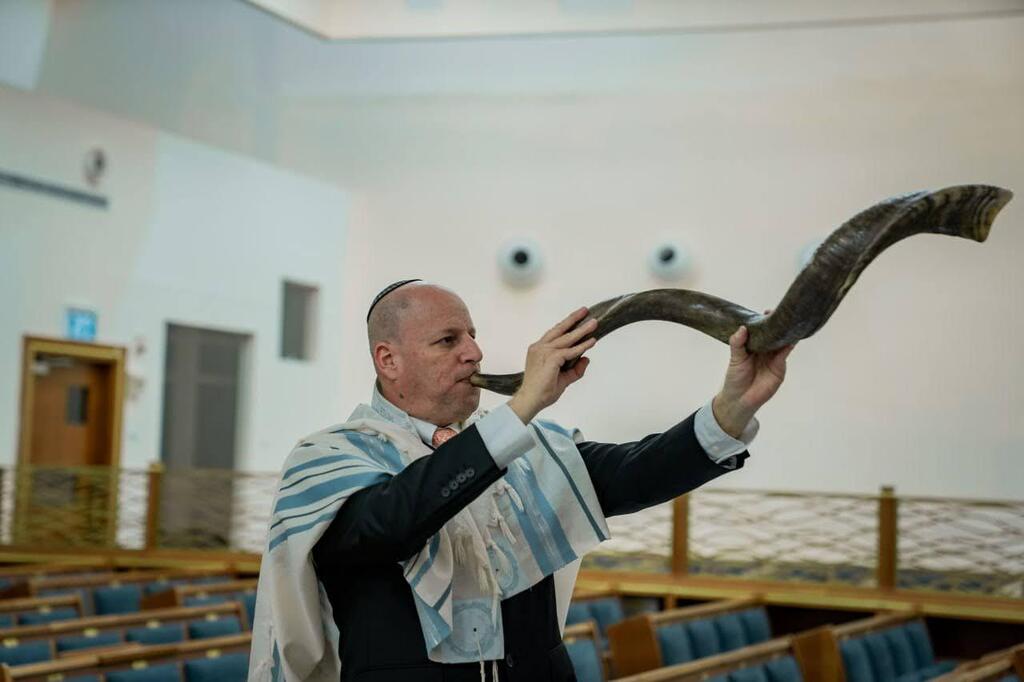Getting your Trinity Audio player ready...
Amit Sofer - Halleluiah, The Elul Project
(Media Pro, Itamar Sofer)
Shofar, the most ancient musical instrument used for religious purposes and mainly identified with synagogue, Rosh HaShanah and Yom Kippur can now be heard also in grand concert halls. Amit Sofer, a trumpet player, takes the Shofar one step further, beyond the Tekiah, Shevarim and Teruah routines (from the Jewish prayer book), and turns it into a real musical instrument.
Read more:
On top of all that, Sofer claims to own the longest Shofar in the world - 1.74 meters (5'8.5) long – and nowadays he is in the process of registering it in the Guinness Book of Records.
Amit sofer with possible World record Shofar
(Video: Ilan Braidman)
At present, Sofer is known as an international Shofar artist, not only in shuls on Elul (Jewish month that starts today, in which it is costumed to use the shofar every day on morning ceremony) and Tishrei (the Jewish High Holidays month). He plays with the Ra'anana Symphonette and is probably the only musician who ever played the Shofar live on stage, with an orchestra of 80 players, the classical Jewish prayer tune Avinu Malkeinu.
He plays in national ceremonies, before presidents, ambassadors and consuls, and he is also very popular among the huge evangelistic community, "because the Shofar, as far as they are concerned, is much more than just a symbol," explains Sofer.
Sofer has a fixed repertoire, and he plays with the Shofar a wide variety of tunes and styles, ranging from Jewish melodic songs like Avinu Malkeinu and Adon Ha'Selihot, through Israeli songs like Jerusalem of Gold (Yerushalayim Shel Zahav) and Hava Nagila, to, surprisingly, international renowned pieces like Khachaturian's classical music piece Sabre Dance, and even Leonard Cohen's Hallelujah. "The Hallelujah piece felt like magic," says Sofer. "The arrangement with the piano, the violin and the Shofar was really touching, special and unusual," he adds.
Since the Shofar is limited in sound, and can produce only some notes of a musical piece, whenever necessary he also co-operates with other musicians, guest players, while on stage. "With their instruments, they play the notes that the Shofar cannot produce," he explains. In addition, he uses in his performances 3 Shofars, "each Shofar produces a different musical scale, and is being used for a different song," says Sofer. There are also cases where the Shofar can play an entire song solo.
Sofer already played in Paris, England, Canada, New York and now prepares for a concert in Brazil. "The most beautiful and exciting thing for me is that my audience is diverse", says Sofer. "It is a blend of Hassidim, orthodox Jews, national religious Jews, secular Jews, and also non-Jews. It is a mixed audience who is united in music and shares the same excitement to the sound of the Shofar. I take familiar songs and make them accessible to everyone; this makes the unity in the heart. When I get off stage at the end of a performance and receive a huge embrace from the audience, I know we all win, it is worth it. When people tell me how enthusiastic they felt during the concert, this is what really matters.
Can every brass player should be able to play the Shofar?
In principle, musicians who play trumpet, trombone and French horn, may find it easier to play the Shofar. It is a matter of technique; besides that, playing the Shofar requires a high level of concentration, because, similar to violin, it feels like 'wandering in the dark'; you don’t know exactly where to hit in order to reach the right note.
Do you perform all year long, or mainly during the Tishrei holidays?
My activity is divided into three: 1) throughout the year I am invited to perform in family celebrations, Weddings, Bar Mitzvahs 2) I play before Evangelistic tourists when in Israel at dinner parties and tours; 3) I play in ceremonies and state events.





